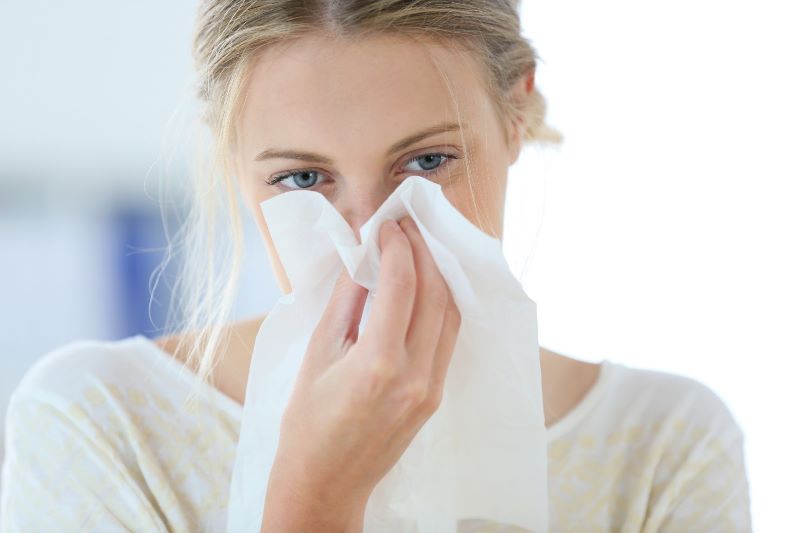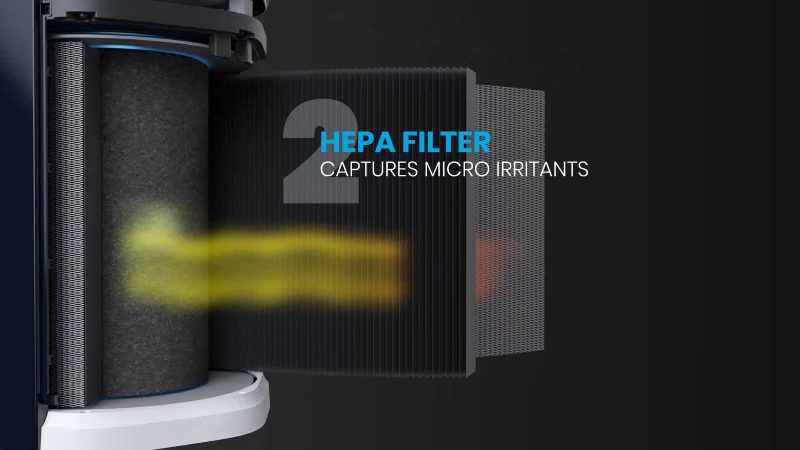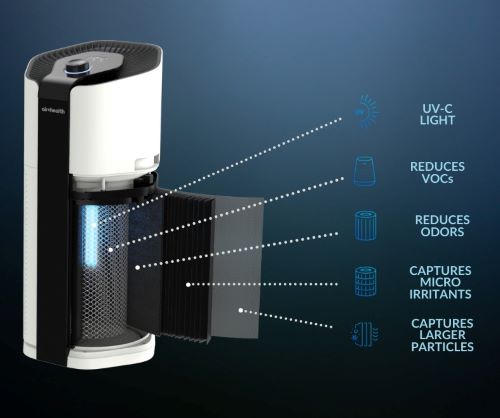Spring allergies got you down? Does someone in your house suffer from seasonal allergies or pet allergies? You’re not alone, as more than 50 million Americans suffer from allergies, whether it be seasonal, pet, or any other.

In the spring, common outdoor allergens include pollen, mold and mildew while indoor allergens, such as pet dander and dust mites, can be present any time of year. Whatever the allergy may be, it is a common struggle. The sneezing, coughing and red eye symptoms that come with allergies can make us feel much less than ourselves. It can be hard to concentrate at work, or enjoy a walk with our dog. For people with asthma, the symptoms can even pose a serious threat to their health. Those that suffer are always looking for solutions to minimize the reaction to indoor and outdoor allergies, including adding air purifiers for allergies.
It is common to blame the blooming outdoor trees, flowers, and grass for our allergy issues. Although it is correct that those allergens are the source of the problem, your indoor air can actually be exponentially more polluted than outdoor air. As the weather gets nicer, we tend to open our doors and windows more often. Although we think we’re letting in the fresh spring air, it creates an opening for allergens such as pollen to enter and get trapped inside along with indoor allergens, creating a perfect environment for allergies to thrive.
Because people spend 90% of their time in homes and offices, according to the EPA, it is especially important to be aware of these allergens and pay attention to our air quality indoors.
Combatting Allergies
So, how can we fight back against these allergens? Here are a few options:
- You may reduce allergens by keeping doors and windows closed, monitoring pollen count and staying indoors when pollen counts are high. Try visiting pollen.com for current readings in your area.
- Change air filters regularly in your furnace.
- Vacuum and dust often to remove allergens from surfaces.
These are all great strategies, but if you want to take protection a step further, consider getting a high-quality air purifier to control the allergens in your home. We recommend using an allergy air purifier in combination with the strategies listed above to be the most effective in fighting allergies.
How Can an Air Purifier Help with Allergies?
Air purifiers can reduce the allergens in your indoor air year-round. You can choose to use an in-duct air purifier or a portable air purifier , depending on your needs. In-duct air purifiers will treat the air throughout your entire home, but can require more expertise to be installed into your HVAC system. A portable air purifier is a standalone unit, good for purifying a particular part of your home — ideally an area close to the source of the allergens or where a person who suffers from allergies spends the most time.

A high-quality air purifier will have a High-Efficiency Particulate Air filter, also known as a HEPA filter, designed to trap small particles and prevent them from circulating in your home. There are different HEPA ratings that determine how well the filters remove small particles. The American Society of Heating, Refrigerating and Air Conditioning Engineers uses different ratings to determine how well HEPA filters remove small particles. The rating compares the filter’s efficiency to the particle size it can trap, on a scale from 1 to 20. So, the higher the rating, the better the filter is at trapping particles.
- H6 - H8 rated filters offer the bare minimum in efficiency.
- H8 - H10 rated filters capture more of the large particles in an area and about half of the smaller particles like pollen, mold and mildew spores. These are the most common ratings for lower priced HEPA filters in residences.
- H11 - H13 rated filters are efficient at capturing almost all the larger particles, plus the majority of smaller ones. H13 air filters are considered the highest possible rating for residential air filters, capable of removing 99.97% percent of 0.3 micron particles, down to 0.1 microns.
H8 or H10 rated filters could be compared to a chain link fence since H8-H10 will keep out large particles, but not smaller ones, while an H13 rated filter will keep out the smallest bugs and particles. H13 is typically used in hospitals, labs and industrial settings for the higher level of protection.
What Allergy Air Purifier is right for me?
Finding an air purifier with technology that can help with allergies isn’t easy. Many of the low-end air purifiers are only going to have an H-8 - H10 HEPA filter which may not stop the allergens from circulating through your house. To get the better protection from allergens, you should look for an air purifier with an H13 HEPA filter which is capable of removing 99.97% percent of 0.3 micron particles. For reference, viruses are in the .3 micron particles range. Not only does the SKYE Portable Air Purifier have a H13 rated HEPA filter, this energy-efficient, high-technology allergy air purifier works in five stages:

- Pre-filter removes large particles like dirt, hair and dust.
- Medical-grade H13 HEPA filter removes microscopic allergens and irritants.
- PRO-cell technology breaks down VOCs such as formaldehyde and also chemicals from paints and new carpet.
- Powerful ultraviolet(UVC) lamp reduces bacteria, mold and fungi.
- Charcoal filter removes gases and odors.
Beyond the cutting-edge air purification methods, SKYE is a smart unit. It has sensors and will automatically increase the fan speed to clean the air if the air quality decreases and then return to a preset lower level. You can also use an application on your phone to monitor and adjust air quality allowing you to control your allergy air purifier no matter where you are. SKYE also integrates with Google Assistant and Alexa for extra convenience.
Air Health utilizes the highest-quality advanced air treatment technology, so we can guarantee that our products effectively fight against allergies, alongside any other issues that can be made worse by poor indoor air quality.
Feel free to contact us with any questions you may have about how air purifiers can help manage allergies.
 US Dollars
US Dollars
